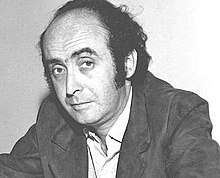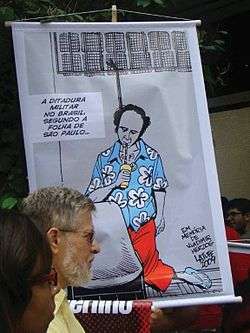Vladimir Herzog
Vladimir Herzog (27 June 1937 – 25 October 1975), nicknamed Vlado, was a Brazilian journalist, university professor and playwright of Croatian Jewish origin. He also developed a taste for photography, because of his film projects.[2] In the family and among his friends was called Vlado[3] (that is a usual Croatian abbreviation for the name Vladimir).[4]
Vladimir Herzog[1] | |
|---|---|
 | |
| Born | Vladimir Herzog 27 June 1937 |
| Died | 25 October 1975 (aged 38) |
| Cause of death | Murder |
| Education | Bachelor's degree, University of São Paulo |
| Occupation | Journalist Professor Playwright |
| Spouse(s) | Clarice Herzog |
| Children | Ivo & Andre Herzog |
| Website | http://www.vladimirherzog.org/ |
Herzog was a member of the Brazilian Communist Party and was active in the civil resistance movement against the Brazilian military government. In October 1975, Herzog, then editor in chief of TV Cultura, was tortured to death by the political police of the military dictatorship, which later forged his suicide.[5] Over 37 years later, his death certificate was revised to say that Herzog had in fact died as a result of torture by the army at DOI-CODI.[5] His death had a great impact on the Brazilian society, marking the beginning of the redemocratization process of the country.[2][4]
Biography
Early life
Herzog was born in Osijek, Kingdom of Yugoslavia province of Sava Banovina (currently Croatia) on 27 June 1937, to Zigmund and Zora Herzog, a Croatian Jewish[6] family who emigrated to Brazil in the early 1940s, to escape Nazi persecution.
Education and career
Herzog received a bachelor's degree in Philosophy from the University of São Paulo in 1959. After his graduation, he worked as a journalist in major media outlets in Brazil, notably in the newspaper O Estado de S. Paulo. During that period he decided to use "Vladimir" instead of "Vlado" as his first name, because he felt that his real name sounded extremely exotic in Brazil.[4] Herzog would later work in London for the BBC for three years.
In the 1970s Herzog became the editor-in-chief of TV Cultura, a public TV station managed by the São Paulo State government. He also became a journalism professor at the University of São Paulo School of Communication and Arts and at Fundação Armando Alvares Penteado's defunct Journalism course. He developed a career as a playwright, gathering with theater intellectuals. Later in his life, Herzog became active in the civil resistance movement against the military dictatorship in Brazil, as a member of the Brazilian Communist Party (Portuguese: Partido Comunista Brasileiro - PCB).
Arrest and death

On 24 October 1975 – when Herzog was already editor-in-chief of TV Cultura – Brazilian Army agents summoned him to testify about his connections with the then illegal PCB.[7][8][9] The following day, Herzog went to the DOI-CODI in order to comply with the summons. His interrogation, however, was conducted through a torture session. He was arrested with other two journalists, Jorge Duque Estrada Benigno and Rodolfo Konder, who later confirmed his beating.[7]
On 25 October, Herzog's body was found hanging in his prison cell. Before revision, his death certificate stated "suicide by hanging". According to opposition, the DOI-CODI officers would have placed his body in the position it was found in order to inform the press that he had committed suicide.[10]
Aftermath
Herzog was married to advertising agent Clarice Herzog, with whom he had two children. With the death of her husband, Clarice went through rough times having to tell her young children what happened to their father. Three years later she was able to legally blame the Union for the death of her husband. Still unable to cope with Herzog's death, she has said that "Vlado would contribute more to society if he were alive". Generating a wave of protests from the international press, and initiating a process in defense of human rights in Latin America, the death of Herzog boosted the movement against the military dictatorship in Brazil.
The autopsy was inconclusive, but at the time forensic pathologists were members of the police and systematically produced false autopsy reports in cases of death by torture.[11]
Public opinion, however, never accepted this version and his murder generated national indignation. The president of the Republic at the time, General Ernesto Geisel was also upset by these and other actions by what he called the "criminals" of the largely parallel power of military-directed violent political repression. As a result, he ordered a clean-up and reduction in these activities, firing the main ultra-right wing general behind it, Ednardo D'Ávila Melo.
According to Henry Sobel, the chief rabbi of the main synagogue of São Paulo at the time, the murder of Herzog changed the country. "It was the catalyst of the eventual restoration of democracy. His death will always be a painful memory of a shady period of repression, a perpetual echo of the voice of freedom, which will never be kept silent".[12]
After finding out that Herzog's body bore the marks of torture, Rabbi Sobel decided that he should be buried in the center of the cemetery rather than in a corner, as Jewish tradition demands in cases of suicide. This was made public and completely destroyed the official version of suicide. Officially, the first irrefutable proof that Herzog's death was not a suicide was reported in Fernando Pacheco Jordão's Dossier Herzog - Prisão, Tortura e Morte no Brasil. The author points out that the picture provided by the military as proof of Herzog's suicide portrayed the prisoner hanging by his prison belt tied in his cell's bars with his feet touching the floor and his knees notably bent.
By the time of Herzog's death, Brazil was in extreme tension. The military had been in power for over ten years and the Brazilian population was constantly in fear.[13] Herzog was the thirty-eighth person to "commit suicide" after being arrested by the military. The first thirty-seven however, were not as renowned as Herzog was. Precisely because he was a public figure his death attracted public and governmental attention to the case. His death is seen today as the beginning of the end of the Brazilian military dictatorship. Herzog has become a symbol of the fight for democracy in Brazil and has been honoured in many ways, such as by attributing it to the street where the TV Cultura is located in São Paulo. In addition, a public prize for journalism devoted to amnesty and human rights has been established with his name (Prêmio de Jornalismo Vladimir Herzog de Anistia e Direitos Humanos).
Later, in a civil lawsuit filed by his widow against the government, a federal tribunal recognized his wrongful death and granted monetary damages to Herzog's family. A documentary by director João Batista de Andrade, titled Herzog - 30 anos, was filmed in 2005. In the same year, new photographs of a still-living and fully naked Herzog in the prison cell were released on the Internet, authorized by a high-ranking military officer in president Luiz Inácio Lula da Silva's office.
At the request of several religious and human rights groups, the Inter-American Commission on Human Rights, which is part of the Organization of American States, will investigate the conflicting circumstances surrounding the death of Vladmir Herzog, according to a 23 January 2013 announcement.[14][15][16]
A new death certificate was issued 37 years after Herzog's death to indicate that he died "due to physical torture at the facilities of DOI-Codi in the 2nd Army in São Paulo." His previous certificate indicated a possible suicide.[5]
Ivo Herzog, son of Vladimir Herzog, delivered petitions for José Maria Marin's removal from the Brazilian Football Confederation (CBF) and from the 2014 FIFA World Cup. Ivo cited the speeches Marin delivered as congressional representative that praised Sérgio Fleury, who was head of the Department of Political and Social Order (Departamento de Ordem Politica e Social) during Brazil's military dictatorship, and for criticizing Herzog in speeches from 1975.[17]
Legacy
In 2009, over 30 years after Herzog's death, the Vladimir Herzog Institute[18] was founded. Its aims are to archive material about Herzog, to promote debate about the role of journalists and new media, and to award the Vladimir Herzog Prize for Amnesty and Human Rights to journalists and human rights activists.[19]
See also
- List of unsolved murders
References
- "Vladimir Herzog". Brown University Library. Brown University Library.
- "Quem foi Vladimir Herzog", no Instituto Vladimir Herzog.
- "Name Vlado @ Acta Croatica".
- Freitas, Daelcio. "Jornalista morto pelo regime militar: Vladimir Herzog", UOL Educação.
- "Family receives new death certificate of journalist killed during Brazilian dictatorship". Folha de S.Paulo. 2013-03-16. Retrieved 2013-03-17.
- "Jewish voices in Brazilian literature: a prophetic discourse of alterity". www.books.google.hr. Nelson H. Vieira.
- "Herzog, torturado e morto em outubro de 1975".
- ["Nos Tempos da Ditadura"].
- "PC DO B ".
- "Vladimir Herzog Case of journalist murdered during Brazil´s military dictatorship". cejil.org.
- The Search for Brazil's Disappeared - The Mass Grave at Dom Bosco Cemetery by The physicians for human rights on March 13, 1991
- Sou Eu, Quem. "WLADIMIR HERZ0G - MUDANDO O PASSADO !!". MARQUESI - NEWSLETTER. Retrieved March 5, 2013.
- Lamond, Ian R. "Remembrance of things present: Vladimir Herzog and democracy in contemporary Brazil". opendemocracy. DEMOCRACIAABIERTA. Retrieved November 23, 2018.
- Associated Press (2013-01-23). "Brazil's Truth Commission investigates death of former president Juscelino Kubitschek". Washington Post. Retrieved 2013-01-26.
- Stan Lehman, Associated Press (2013-01-23). "Brazil investigates death of former president". WHEC TV. Archived from the original on 17 February 2013. Retrieved 2013-10-16.
- Agência Estado (2013-01-23). "OEA inicia investigação do caso Vladimir Herzog" (in Portuguese). Retrieved 2013-01-26.
- "Son of journalist killed during Brazilian dictatorship asks for support to oust Marin from CBF". Folha de S.Paulo. 2013-04-02. Retrieved 2013-04-02.
- "Instituto Vladimir Herzog - Ação em defesa dos direitos humanos, democracia, liberdade e justiça social" (in Portuguese). Retrieved 2013-10-16.
- Ogar, Jude. "42nd Vladimir Herzog Journalistic Award for Amnesty and Human Rights 2020". opportunitydesk. Opportunity Desk.
External links
- Testimonials of witnesses (in Portuguese)
- Press clippings at the time of his death (in Portuguese).
- Photos bring up past for Brazilians. The military's response to the publishing of photos of a journalist who died in army custody decades ago has revived anger over military abuses. NY Times News Service, Rio de Janeiro, Monday, October 25, 2004.
- Amnesty International: Brazil: Healing the scars